
நிக்கோலோ மச்சிவெல்லி (3 மே 1469 - 21 ஜூன் 1527) மறுமலர்ச்சிக் காலத்தில் வாழ்ந்த இத்தாலியத் தூதர், எழுத்தாளர், தத்துவவாதி, வரலாற்றாசிரியர் மற்றும் அரசியல் ஆர்வலர். 1513-ஆம் ஆமாண்டில் எழுதப்பட்ட அவரது அரசியல் கட்டுரைகளின் தொகுப்பு ‘தி பிரின்ஸ்’ மிகவும் பிரபலமானது, ஆனால் 1532 வரை வெளியிடப்படவில்லை. அவர் ‘நவீன அரசியல் தத்துவம் மற்றும் அரசியல் அறிவியலின்’ தந்தை என்று அழைக்கப்படுகிறார்.
‘தி பிரின்ஸ்’ புத்தகத்தில் அரசியல் தொடர்பான பல கருத்துகள் உள்ளன. இது ஒரு புதிய அரசனை உருவாக்கும் கவனத்தைச் செலுத்துகிறது (தற்கால சூழலில் புதிய நிறுவனங்கள் என நாம் புரிந்து கொள்ளலாம்). அதிகாரத்தைத் தக்கவைக்க, பல்வேறு நிறுவனங்களின் நலன்களைக் கவனமாகக் சமநிலைப்படுத்த வேண்டும். இதற்கு நேர்மாறாக, ஒரு புதிய அரசனுக்கு ஆட்சி புரிவதில் மிகவும் கடினமான பணி உள்ளது. நீடித்த அரசியல் கட்டமைப்பைக் கட்டியெழுப்ப அவர் முதலில் தனது புதிய அதிகாரத்தை உறுதிப்படுத்த வேண்டும். தார்மீக ஊழலை எதிர்கொண்டு சமூக நன்மையையும் அதன் பாதுகாப்பையும் அடைய முடியும் என்று மச்சியாவெல்லி உணர்த்தியுள்ளார். மச்சியாவெல்லி, பொது சமூக அறநெறிகளையும் மற்றும் தனிமனித அறநெறிகளையும் வெவ்வேறாகப் புரிந்து கொள்ள வேண்டும் என்று தெளிவுபடுத்தியுள்ளார். இதன் விளைவாக, ஒர் ஆட்சியாளர் நற்பெயரை நிலைநாட்ட அதிகம் உழைக்க வேண்டும், ஆனால் சரியான நேரத்தில் தந்திரமான முறையில் செயல்படவும் தயாராக இருக்க வேண்டும் என்பதையும் உணர்த்தியுள்ளார்.
மச்சியாவெல்லியின் ‘தி பிரின்ஸ்’ கோட்பாடுகள் இன்றும் பொருந்தும். நிர்வாகத்தின் முக்கிய உத்திகள் மற்றும் மேலாண்மை தலைப்புகளில் உணர்த்துகின்றன.
* ஆட்சியின் நிரந்தரத்தன்மை
* ஒன்றிணைத்தல்
* கூட்டாண்மை
* பாரம்பரிய அடிப்படையிலான நிர்வாகம்
* திறன் அடிப்படையிலான நிர்வாகம்
* ஒப்பந்த நிர்வாகம்
* நிலைத்தன்மை
* திறன் மேலாண்மை
* போட்டி மேலாண்மை
* ஆலோசனைகள்
Niccolo Machiavelli (3 May 1469 - 21 June 1527) was a Renaissance Italian Ambassador, Writer, Philosopher, Historian, and Political Activist. His collection of political essays, written in 1513, is very popular but was not published until 1532. He has been called the father of 'Modern Political Philosophy and Political Science'.
The book 'The Prince' contains many ideas related to politics and governance. It focuses on creating a new kingdom (in contemporary context Startups/new Companies). In order to retain power, the interests of the various institutions must be carefully balanced. On the contrary, a new king has a very difficult task of ruling. He must first secure his new power in order to build a lasting political framework. Machiavelli has realized that in the face of moral corruption one can achieve social good and security. Machiavelli made it clear that public social morality and individual morality should be understood differently. As a result, a ruler must realize that he has to work hard to maintain a good reputation but is also prepared to act tactfully at the right time.
Principles from 'The Prince' by Machiavelli are applicable even today and address critical strategy and management topics on governance.
- Stability in Governance
- Merge & Acquisition
- Partnership & Ecosystem Benefits
- Tradition based governance
- Capability based governance
- Contract Governance
- Sustainability
- Capability Management
- Competition Management
- Advises & Councils